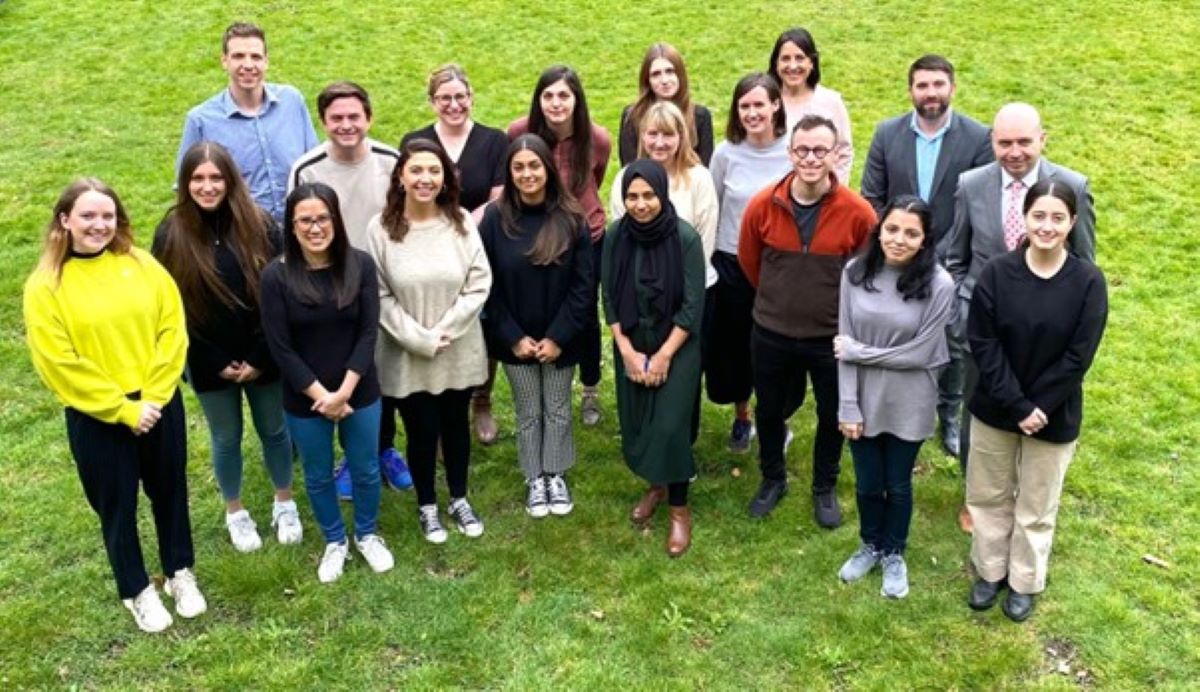In 2017, our funding established the Preventive Neurology Unit at Queen Mary University of London.
The unit brought together an ambitious team, including Ruth Dobson, Alastair Noyce and Charles Marshall, to pilot new, revolutionary research into dementia, Parkinson’s disease and multiple sclerosis (MS), tackling issues relevant to our local East London community.
Since then, their work has expanded significantly. The team has published over 300 scientific papers, influenced NHS treatment guidelines for nitrous oxide and for MS risk in pregnancy, and helped bring specialist dementia services to people in East London who didn’t have access before.
In 2023, the unit’s incredible work was recognised when it officially became a Centre for Preventive Neurology (CPN) – the only centre of its kind in the UK.
Ruth, Alastair and Charles – who began as early career researchers at the unit – now lead three key areas of research.
Improving early detection of Parkinson’s disease
Alastair Noyce is a Professor in Neurology and Neuroepidemiology, specialising in the treatment and detection of Parkinson’s disease. The key aim of his research is to find a better way of predicting Parkinson’s disease in patients and introducing treatments which will help to prevent or slow down the disease.
Alastair explains why improving early diagnosis in patients is vital:
“Usually, when people get a diagnosis of Parkinson’s disease, it’s been going on for decades and a lot of important brain cells have been lost, so improving early detection is a key component of our work in order to test treatments that can slow it down.”
One key project called PREDICT-PD is a web-based study which identifies people at risk of developing Parkinson’s using a prediction algorithm. It’s one of the first online cohort studies in its field and, if successful, will be a key first step in providing timely treatments to patients at the early stages of their symptoms progressing.
Alastair has also led research into the damaging effects of recreational laughing gas usage, which has seen a surge in East London in recent years. Nitrous oxide is one of the most commonly used drugs by 16-24 year olds and can result in long-term damage to the nervous system.
In 2023, the team developed local treatment guidelines which have since been endorsed by the Association of British Neurologists. This work helps doctors and healthcare workers better understand the harms of laughing gas and provides consistent guidelines for treating patients. In 2024, this work was ‘highly commended’ at the Health Service Journal (HSJ) awards.
Find out more about this research here.
“Barts Charity kicked all of this off. The funding we received in 2017 set the first ball rolling and we want to continue to grow the Centre with more areas of focus. Being the Preventive Neurology Unit allowed us to become a Centre, which we're extremely proud of.”Alastair Noyce
Diagnosing dementia in a diverse UK population
Charles Marshall is a Professor of Clinical Neurology and dementia expert who leads the CPN’s dementia related research projects. This area of research aims to understand the risk factors for dementia by understanding why it occurs in different groups of people and why, using primary care data from East London.
Much like Parkinson’s disease, Charles stresses the importance of early detection and diagnosis for dementia:
“Within the NHS, less than two thirds of people living with dementia have a diagnosis and often have to wait over three years for that diagnosis. Our work is geared towards improving equitable access to a speedy diagnosis so people can get the treatment they need at that early stage.”
In 2022, Charles led research which discovered that people from minority ethnic groups and socioeconomic deprived backgrounds are more at risk of developing dementia. This was the first dementia study to represent the diversity of the UK population and highlighted the importance of prioritising dementia prevention in underrepresented communities.
His team are now working on a study which uses AI on routine brain scans to identify dementia at an early stage in patients.
“Alastair, Ruth and I are such a good team and support each other so well. It's been key to our success. Having the three of us come in at a relatively early stage in our career and having the freedom to grow has been amazing. We've been able to find our own direction, explore and grow and we're so grateful to Barts Charity for that."Charles Marshall
Improving understanding of MS and its risk factors
Ruth Dobson is a Professor of Clinical Neurology and Centre Lead at the CPN. She leads the CPN’s research into multiple sclerosis (MS), with a particular interest in MS in pregnancy, and how treatment drugs may affect the relative safety of both the patient and their baby. Her team has since published guidelines for treating MS in pregnancy.
Ruth explains some of the difficulties in understanding and diagnosing MS in a diverse population.
“Whilst there’s a strong public narrative around dementia and Parkinson’s disease, it’s not really the case for MS. It is much less common, and people tend to get it at a younger age.
“There is a perception that risk factors are different for different ethnic backgrounds, but what we’re realising is they are more or less the same. The difference we are seeing is the ability to access high quality healthcare and get a timely diagnosis. These are not biological factors, but social factors.”
A key element of Ruth’s research is in finding and understanding different risk factors which could play a part in developing MS, such as smoking, adolescent obesity and the Epstein-Barr virus. This work has resulted in Ruth’s involvement in shaping national guidelines and international consensus statements, as well as the specific insertion of statements around pregnancy planning by NHS England.
“Barts Charity funding allowed everything to happen. I was working full time in the NHS, so the funding has allowed me the space to grow and develop all of these strands of work.”Ruth Dobson


